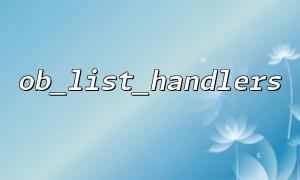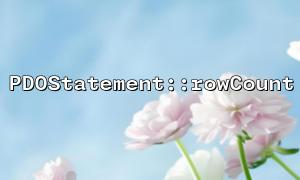In PHP development, ob_list_handlers() is a very useful function that can return the current output buffer handlers. By using this function, we can identify whether there are multiple handlers in the buffer that conflicts and take appropriate measures to resolve these problems. Conflicts in cache handlers often cause the output to not display as expected and may even have performance issues.
This article will introduce in detail how to identify conflicts in cache handlers through the ob_list_handlers() function and provide some solutions.
The ob_list_handlers() function returns a list of all active handlers in the current PHP output buffer. The function of the output buffer handler is to control the processing of the output content, such as compressing, modifying or cacheing the content. Each handler has different functions, and conflicts usually occur when multiple handlers interfere with each other.
<?php
// Show the current buffer handler
$handlers = ob_list_handlers();
print_r($handlers);
?>
This snippet will output all currently active buffer handlers. The return value is an array containing the name of the handler.
Cache handler conflicts usually occur when multiple handlers try to modify or control the same output. For example, when compression handlers and output replacements exist at the same time, they may conflict, causing the content of the page to not render as expected.
Compression and replacement conflict : If the compression handler and content replacement handler are enabled, the replacement program may modify or delete the compressed data, resulting in an error.
Multiple Output Buffer : Multiple Output Buffers may overwrite each other, resulting in incorrect page display or performance issues.
Using ob_list_handlers() we can first list all handlers to confirm whether there are conflicting handlers. If unnecessary handlers or conflicting handlers are found, we can end specific buffer processing through ob_end_clean() or ob_end_flush() , or directly use ob_start() to restart the buffer.
<?php
// Start output buffering
ob_start();
// Add a simple cache handler
ob_start(function($buffer) {
return str_replace("example", "gitbox.net", $buffer);
});
// View the current buffer handler
$handlers = ob_list_handlers();
if (in_array('output_handler', $handlers)) {
echo "Discover output handler,Close it。\n";
ob_end_clean(); // End the current handler
}
// Continue to output content
echo "This is a includedexamplestring,Will be replaced withgitbox.net。\n";
// Clean and end the output buffering
ob_end_flush();
?>
In the above code, we first start a simple output buffer and check if the current handler contains output_handler . If the handler exists, it means there may be a conflict. We can end it with ob_end_clean() and then continue to output the content.
In order to avoid handler conflicts in the output buffer, the following methods are recommended:
Choose buffer handlers with caution : Enable only the necessary output buffer handlers to avoid enabling multiple interfering processors at the same time.
Clean up unused handlers : Clean up buffer handlers that are no longer needed via ob_end_clean() or ob_end_flush() .
Check the order of handlers : The order of execution of some handlers may affect the final result, ensuring that the correct order of handlers avoids conflicts.
By using ob_list_handlers() , developers can easily view the current output buffer handler and resolve possible conflicts as needed. Understanding and correctly using output buffers can effectively improve program performance and stability. During the development process, it is important to pay attention to the order of cache handlers and the appropriateness of use to avoid display or performance problems caused by conflicts.















